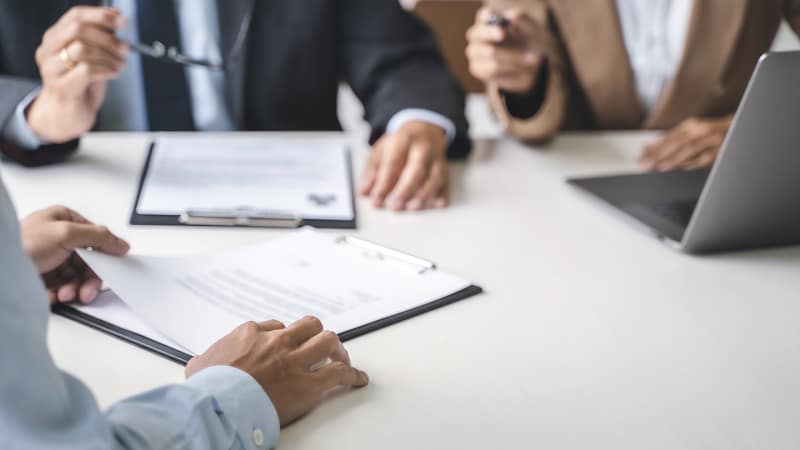How to prepare for and master virtual job interviews

With virtual job interviews increasingly common, you may wonder how you should prepare for them as you apply for jobs and how they may differ from in-person job interviews.
Continue reading as we dive into what to expect from virtual job interviews, how to prepare, tips for mastering the interviews, and what to do after the interviews to stand out to employers.
What’s a virtual job interview?
A virtual job interview is an interview that occurs remotely, so you’ll be interviewed from the comfort of your own home or somewhere else of your choice. Virtual interviews may take place over the phone, but mostly they take place via video conferencing or other online communication platforms.
Beyond the technological differences, virtual job interviews are typically conducted like in-person interviews — expect a question-and-answer format. Like in-person interviews, virtual job interviews tend to range from 30 minutes to an hour in length, although this varies.
How to prepare for a virtual job interview
Since virtual interviews take place remotely and not in the office of the company you’re interviewing with, you may wonder how you should prepare. Here are a few tips.
Update your resume
You’ll most likely be asked for your resume before your interview. Ensure your resume is up to date before the interview and that it aligns with the job description for the job you’re applying for.
During your interview, keep a copy of your resume and the job description accessible for easy reference. This may help you keep your thoughts organized.
Prepare an outfit
It’s best to treat a virtual interview just like an in-person interview and dress professionally. The big difference between an in-person and a remote interview is that you likely only need to dress from the waist up for the interview because of the video format (this should hopefully make things a bit easier).
Because you’ll likely be on video for the interview, one potential tip to consider is wearing a bright, solid-colored top or blazer to make your face pop on the screen. Another tip is to make sure that whatever outfit you go with, that it isn’t too loud; you want your accomplishments to do the talking for the most part, not your outfit.
Test your technology ahead of time
Ensure your internet connection is stable, your webcam and microphone are working properly, and the video conferencing platform you’ll be using is set up correctly. Test everything in advance to hopefully avoid any technical issues during the interview.
Choose a quiet and well-lit location
Find a quiet space to set up where you won’t be interrupted or distracted during the interview. Make sure the lighting is good so the interviewer can see you clearly.
Prepare your surroundings
Make sure your background is clean and tidy. Remove any distractions or personal items that may be visible. Consider using a virtual background to create a more professional setting.
Prepare notes to have on standby
One of the significant advantages of virtual interviews is that you can prepare notes to have handy during the interview. Consider preparing a bulleted list of your key accomplishments, questions you want to ask the interviewer, and anything else you fear you might forget and want to have available to you during the interview.
Practice potential answers
Prepare for interview questions you’re expecting by practicing your answers ahead of time. It won’t hurt to think through how you might want to answer potential questions beforehand. Try to be concise, clear, and confident in your responses.
Make sure you have your interviewer’s contact information should something go wrong
Things can go wrong connecting to virtual job interviews. Maybe you get supplied with the wrong remote meeting number, for instance. Make sure you have the appropriate contact info ahead of an interview in case something should happen so you can rectify any issues quickly.
Tips to succeed during a virtual interview
Use non-verbal communication effectively
Since the interviewer won’t be able to see your body language as clearly as they would if you were in person, use facial expressions and hand gestures to convey your enthusiasm and interest in the role. Maintain good eye contact by looking directly into the camera.
Practice active listening
Show that you’re actively engaged in the conversation with your interviewer by listening attentively to the interviewer’s questions. This will help you provide more relevant and thoughtful responses. Again, eye contact is critical.
Make sure you understand each question before answering
Listen carefully to your interviewer's questions and ensure you fully understand them before responding. If you’re unsure of what something means, ask for clarification or paraphrase the question to make sure you’re on the same page.
Take your time and be concise
Don’t rush to answer questions right away. Take a moment to gather your thoughts and structure your response (and use your notes if you need to). It’s better to provide a well-thought-out answer than to rush and give an incomplete or unclear response.
While providing enough information to answer questions thoroughly is important, avoid rambling or going off on tangents. Keep your responses focused and concise, highlighting the most relevant points.
Provide concrete examples of your accomplishments
Whenever possible, support your answers with specific examples from your past experiences. This will help to demonstrate your skills and abilities and provide concrete evidence of your qualifications. If you’re prone to getting nervous or forgetting concrete numbers, this is where notes can be beneficial.
Stay positive in your delivery
Maintain a positive and enthusiastic tone throughout the interview. Even if you’re asked a challenging question, try to frame your response positively and focus on what you learned or how you overcame a challenge.
Tone might play an outsized role in a virtual job interview because your interviewer will have fewer cues to go on remotely compared to an in-person interview, which is why your delivery can be so important in this setting.
Ask your interviewer questions
Job interviewers want to ensure you’re engaged and excited by the role you’re interviewing for. Questions can help to communicate that. Questions are also important for you as the interviewee to ensure you understand the job and expectations as much as possible.
Refer back to your notes before signing off
It won’t hurt to refer back to your notes to ensure you’ve covered all your key points before signing off from a job interview. Having access to notes is a perk of a remote interview, after all.
What to do after a virtual job interview
Like an in-person interview, after a virtual interview, you’ll most likely be playing the waiting game to see if you made it to the next interview round or got the job, depending on how far you are in the interview process. Regardless of what part of the process you’re in, you may want to write a thank you note to your interviewer to express your gratitude for their time and reiterate your interest in the position and why you’d be a good fit. This will hopefully leave a positive impression and show your professionalism.
Final thoughts
Virtual job interviews are essentially the same as in-person interviews, but the differing format presents unique challenges and opportunities. For instance, sometimes the tech involved presents challenges, but the ability to have notes during the interview can be an opportunity. Above all else, stay calm, be yourself, and showcase your qualifications and skills as effectively as possible.



